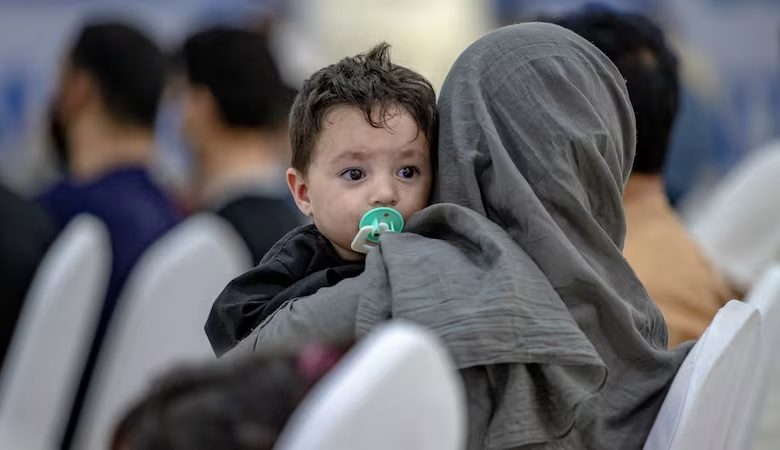
UAE Emerges as Key Transit Hub for 17,600 Afghan Refugees
The UAE has hosted 17,600 Afghans who evacuated from Taliban-controlled Afghanistan since August 2021. These evacuees found safe temporary refuge before their final resettlement elsewhere. UAE’s humanitarian initiative has cost around AED 1.348 billion (USD 367 million), showing the country’s steadfast dedication to help displaced populations. The country also helped evacuate 41,000 people in total, which included both Afghan nationals and foreign residents of Afghanistan.
Afghan evacuees stayed at Emirates Humanitarian City in Abu Dhabi and received complete support. This included healthcare, education, housing, food, and both logistical and diplomatic assistance. The medical care stands out with over 254,572 medical services provided, including 34,923 COVID-19 vaccines and 303 surgeries. UAE’s humanitarian team focused on providing dignified accommodation especially when you have vulnerable groups like children, women, and the elderly. This remarkable response has become one of the region’s most important refugee support operations over the last several years.
UAE hosts 17,600 Afghans after Taliban takeover
The Taliban forces captured Kabul on August 15, 2021, after the US-backed government fell. The UAE quickly emerged as a crucial ally during the humanitarian crisis that followed. Thousands of displaced Afghans found shelter in the Emirates Humanitarian City, a facility originally built to quarantine COVID-19 patients during the pandemic.
The UAE didn’t stop at the original August exodus. They welcomed more Afghan evacuees through charter flights in the months that followed. The facility provided a detailed support system that ensured proper care for evacuees until they could resettle in 21 different countries.
The UAE set up 17 embassy offices within the Humanitarian City to make resettlement easier. They also created spaces for the US Citizenship and Immigration Services, United Nations Migration Agency, US Customs and Border Protection, and international non-governmental organizations.
The UAE went beyond providing simple necessities. They made education and skills development a priority. Their educational programs helped 3,764 Afghans, with 800 children finding places in nurseries and schools. On top of that, 39 educational and skills development courses equipped 2,589 people with tools for their future.
Recreational spaces, outdoor courtyards, and special facilities for vulnerable groups showed UAE’s integrated approach to care. This dedication places the UAE among the top donor countries to Afghanistan, with AED 740 million in aid provided in the last three years.
UAE provides comprehensive support at Emirates Humanitarian City
Emirates Humanitarian City in Abu Dhabi became the main center for Afghan evacuees. The facility provided quality housing and services to its residents. UAE’s government spent AED 1.384 billion to take care of evacuees during their temporary stay.
Medical teams delivered more than 254,572 health services to the residents. They administered 34,923 COVID-19 vaccines and performed 303 surgeries. The medical staff also cared for 303 newborn babies. Three critical patients needed advanced treatment and were flown abroad for specialized care.
The facility made education a key focus, helping 3,764 Afghans through various programs. They arranged transport for 800 children to attend nursery schools. The staff hosted 39 educational and cultural training courses. These courses, combined with job training workshops, helped 2,589 Afghans prepare for their future.
Residents lived in a space built with their comfort in mind. The facility featured outdoor courtyards and recreation areas. It had special spaces for women, children, and elderly residents. A healthcare center looked after everyone’s health. Residents also had access to medicine, food, and basic necessities.
The UAE also gave financial support to help families start fresh in their new homes. This caring approach shows UAE’s commitment to peace, tolerance, and human connection. UAE stands as one of Afghanistan’s top donors, giving AED 740 million in aid in the last three years.
UAE coordinates with international partners for resettlement
“I will try to save them starting right now.” — Donald J. Trump, 45th President of the United States
The UAE worked closely with international partners to make permanent resettlement easier during the Afghan evacuation operation. Emirates Humanitarian City created special processing zones that housed 17 different embassy offices among vital international organizations. U.S. Citizenship and Immigration Services, International Organization for Migration, U.S. Customs and Border Protection, and two international non-governmental organizations maintained offices there.
This shared effort helped process evacuees who relocated to 21 different countries. Reports show that over 10,000 Afghans who first arrived in the UAE have now settled in the United States, Canada, and other nations.
UAE officials remain focused on completing the resettlement process. A UAE representative stated: “The UAE continues to do everything it can to bring this extraordinary exercise in humanitarian resettlement to a satisfactory conclusion”. The U.S. State Department has also confirmed an “enduring U.S. commitment to resettle all eligible Afghans”.
The UAE’s support extended beyond immediate evacuation help. They assisted in evacuating 41,000 more people – both Afghan citizens and foreign residents from Afghanistan – when allied countries asked for help. This multi-year operation required extensive diplomatic coordination between nations.
UAE’s humanitarian response to the Afghan crisis ranks among the most important refugee support operations in the Middle East over the last several years. The Emirates showed its steadfast dedication by hosting 17,600 Afghans at a cost of AED 1.348 billion. They also helped evacuate 41,000 people in total. The complete care at Emirates Humanitarian City included medical services and educational programs. This reflects UAE’s humanitarian values based on peace and tolerance.
The medical support for Afghan evacuees was exceptional. Medical teams provided over 254,572 medical services. These included COVID-19 vaccinations and hundreds of surgeries. The initiative helped families and children too. About 800 children went to schools while thousands joined vocational training programs.
UAE worked closely with international partners to help these displaced people find permanent homes across 21 different countries. The humanitarian city housed embassy offices and processing centers. This made shared international cooperation work better during humanitarian crises.
UAE continues to help beyond this single initiative. The country ranks among top donors to Afghanistan with AED 740 million in aid over three years. Their all-encompassing humanitarian response shows how countries can handle refugee crises while protecting human dignity. Some people still wait for resettlement, but UAE remains committed to bringing this “extraordinary exercise in humanitarian resettlement to a satisfactory conclusion.”






